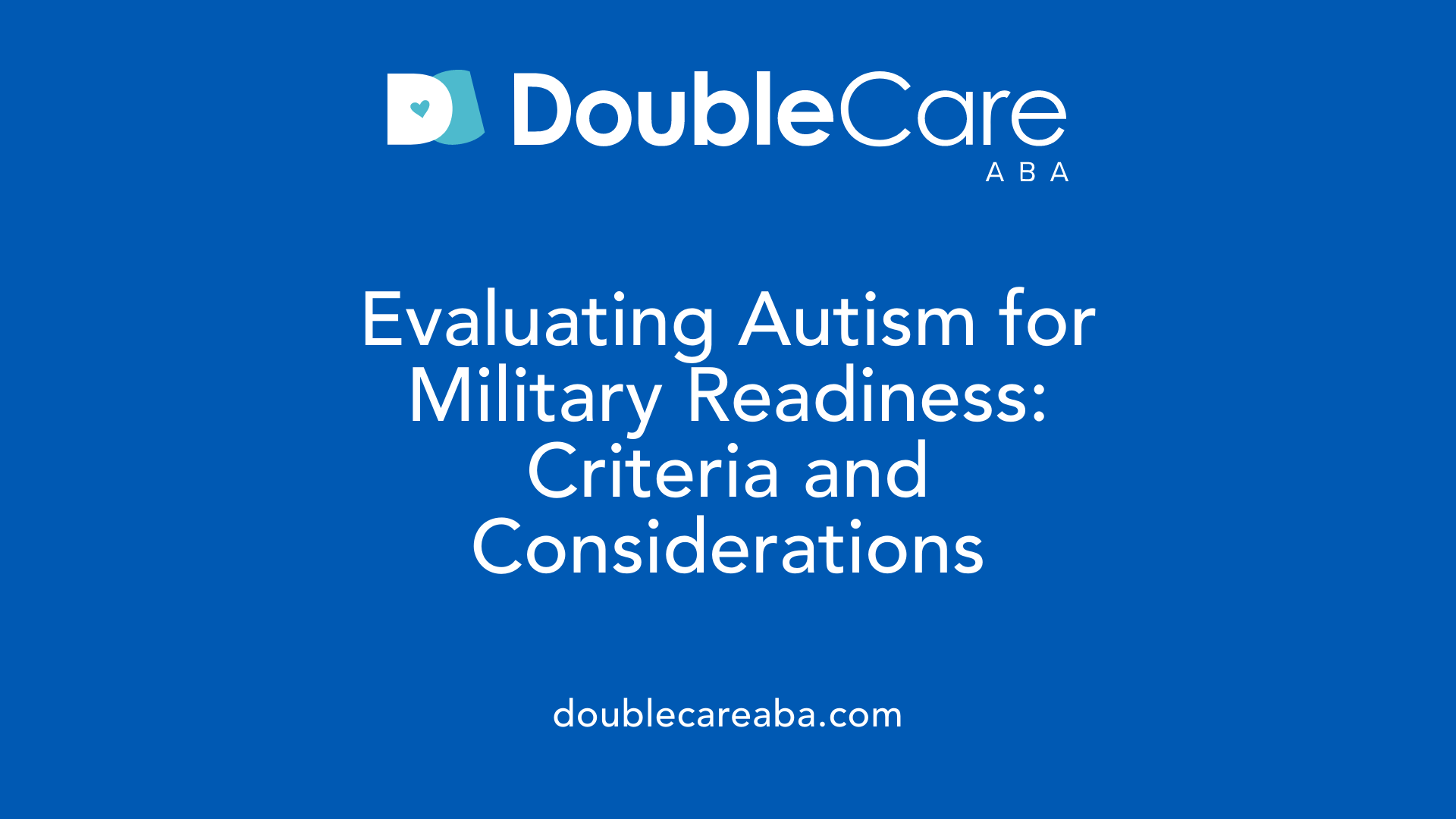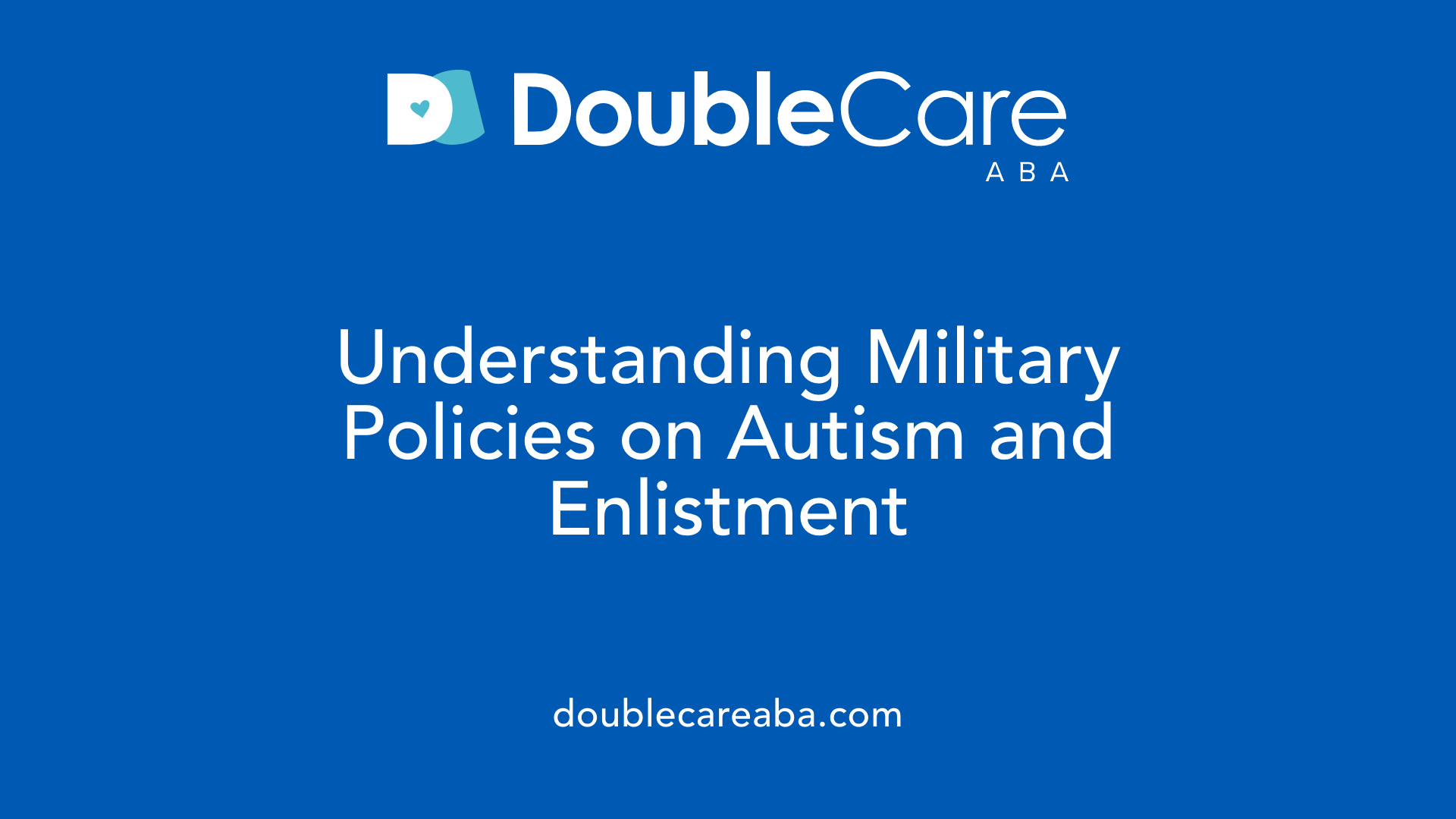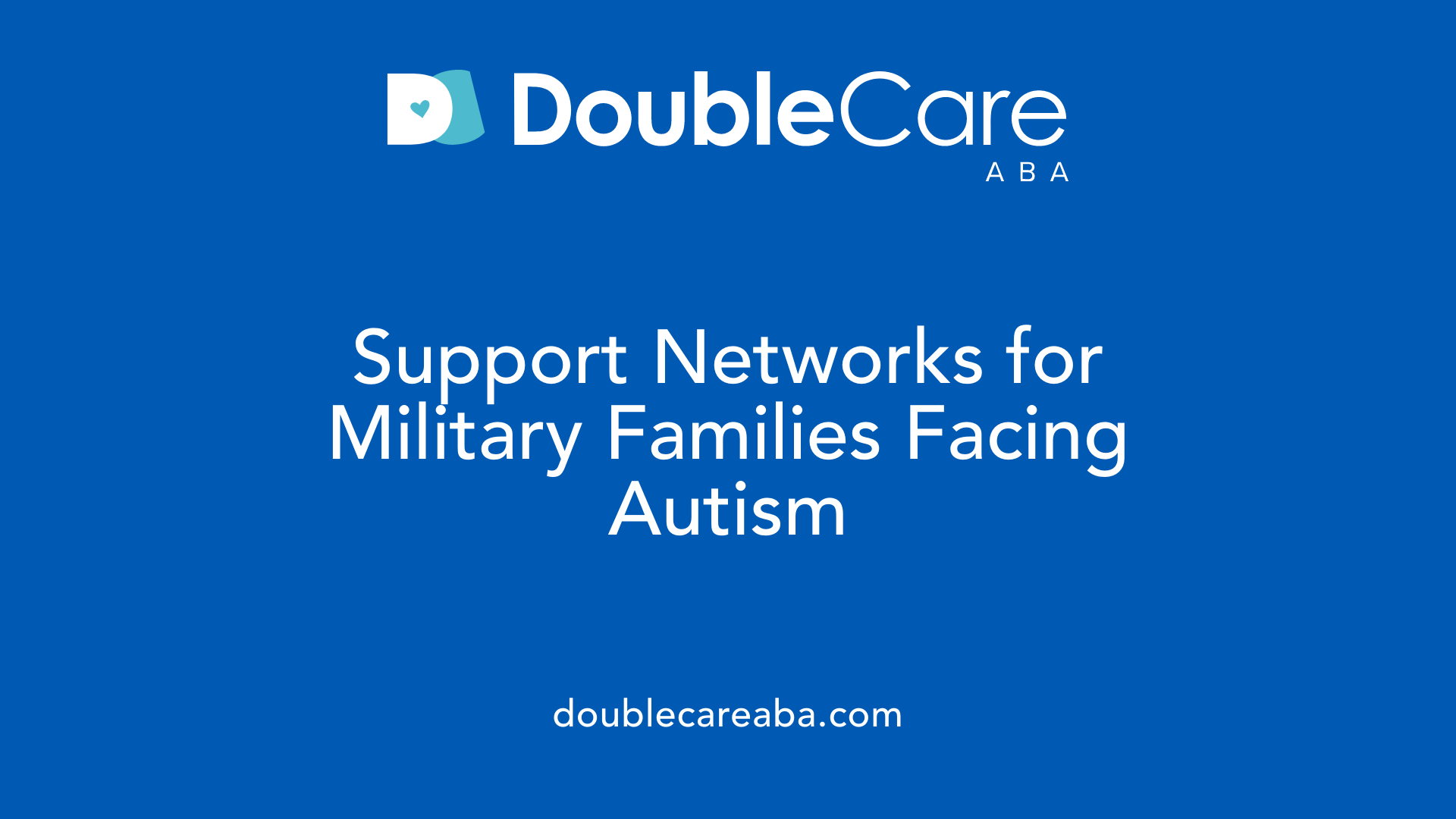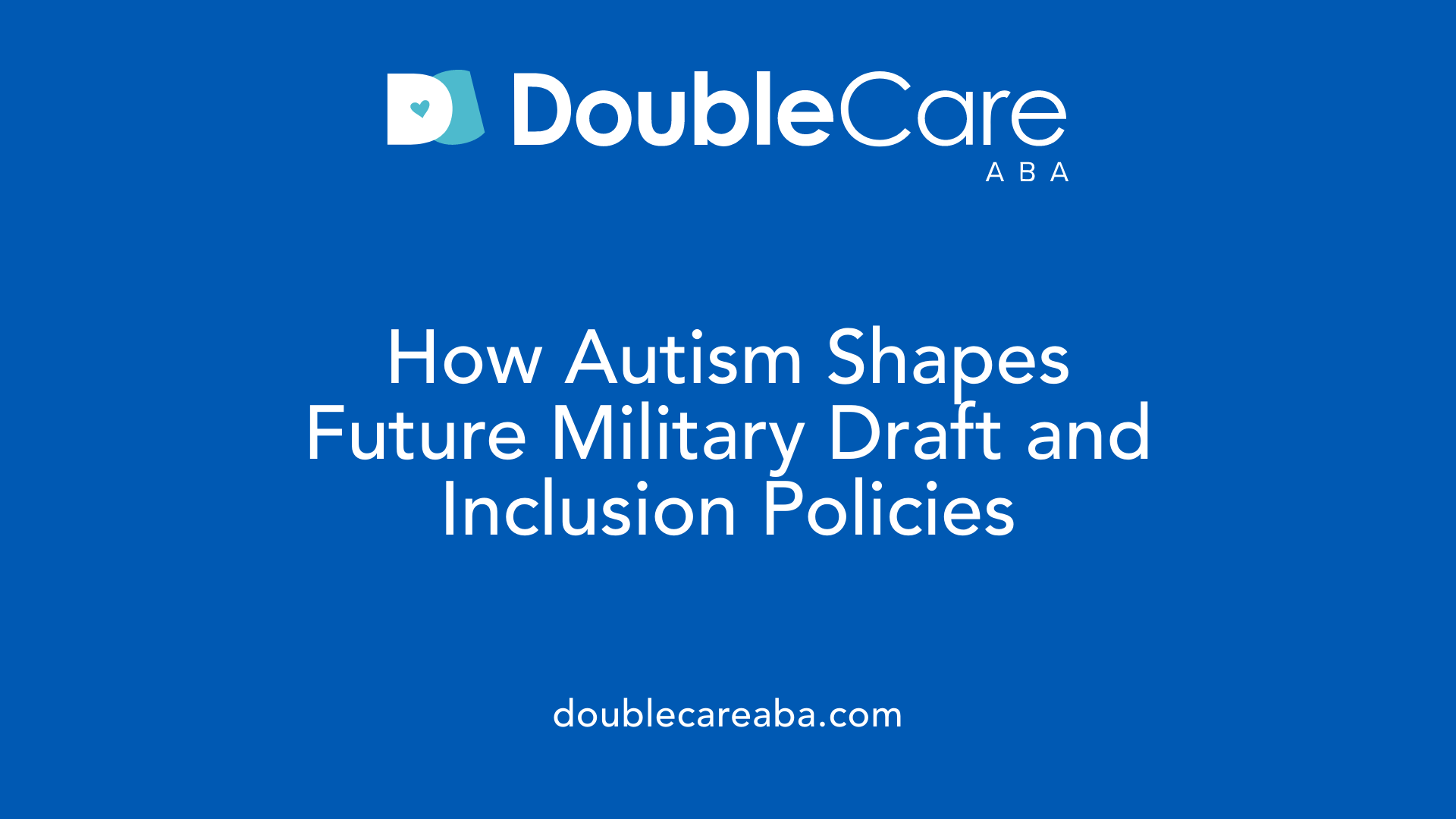Understanding Military Policies and the Pathway to Service for Those with Autism
The question of whether individuals with autism can join the military is complex and evolving. While historically, autism spectrum disorder (ASD) was considered a disqualifying condition, developing policies, increased awareness, and advocacy efforts are gradually opening pathways for some high-functioning individuals to serve. This article explores current military policies, the possibility of waivers, available support programs, and how autism impacts enlistment and draft policies, providing comprehensive insights for prospective service members and their families.
Eligibility and Assessing Readiness for Military Service

Evaluation criteria for autism in military enlistment
The process of determining whether an individual with autism can join the military involves careful evaluation of their medical and psychological status. Enlistment standards set by the Department of Defense include assessments of physical health, mental stability, and the ability to meet operational demands. Applicants must often submit comprehensive evaluations from healthcare professionals, highlighting their level of functioning and stability.
For individuals with autism, the key considerations are how the condition impacts daily functioning, social interaction, and response to stress. Medical documentation must demonstrate that the individual's autism is managed effectively, with minimal symptoms that could interfere with military duties.
Impact of autism severity and functioning levels
The severity of autism significantly influences enlistment possibilities. High-functioning autism, often associated with milder symptoms and cognitive strengths such as attention to detail and logical thinking, may have better chances of eligibility. Many of these individuals can perform well in roles requiring technical skills or analytical abilities.
However, moderate to severe autism, especially when accompanied by significant communication difficulties or sensory sensitivities, may disqualify applicants altogether. The military considers whether the individual’s condition might impair teamwork, adaptability, or response to loud and unpredictable environments.
Role of military branches' standards and policies
Each military branch has its own standards regarding autism. For example, the Army sometimes grants waivers for those with mild symptoms, recognizing their potential contributions. The Air Force typically demands higher scores on aptitude tests and assesses social skills carefully, making entry more challenging but still possible with appropriate documentation.
Conversely, branches like the Marine Corps and Coast Guard tend to be more conservative in granting waivers, focusing on the individual's ability to meet strict operational requirements. Despite these differences, all branches evaluate applicants on a case-by-case basis, often requiring additional assessments and evidence of stability.
In summary, while autism has traditionally been viewed as a disqualifying condition, evolving policies and increased understanding have opened paths for some individuals to serve, especially those with high-functioning autism and well-managed symptoms. Success largely depends on individual assessments, transparency during the recruitment process, and the specific standards of each military branch.
Policies and Standards Governing Autism in Enlistment

What are the military policies regarding enlistment of individuals with autism?
Military policies about enlisting individuals with autism are shaped by the Department of Defense (DoD) guidelines and branch-specific regulations. According to DoD Instruction 6130.03, autism spectrum disorder (ASD), especially in its current, untreated, or symptomatic form, is generally disqualifying for military service.
However, the policies are evolving. High-functioning autism or mild symptoms may not automatically bar applicants. These individuals can potentially qualify through medical waivers, provided they undergo thorough evaluations, present stability, and demonstrate their capabilities.
The Army and Navy tend to be more flexible in granting waivers for applicants with mild symptoms or high-functioning ASD, particularly if the individual can perform essential duties effectively and safely. In contrast, the Marine Corps imposes stricter standards, with fewer waivers granted.
Acceptance depends largely on factors such as the severity of autism, functional ability, and the specific needs of each military branch. For example, individuals with high intelligence, strong social skills, and the ability to adapt may have better chances.
Over time, more policies recognize the potential contributions of individuals with autism. Success stories and advocacy efforts are influencing the military to consider cases on an individual basis, focusing on the person’s abilities rather than their diagnosis alone.
In summary, although autism has traditionally been a disqualifying condition, recent policy adjustments and greater understanding are creating new opportunities for some autistic individuals to serve in the military, often through the use of waivers and accommodations.
Waivers, Exemptions, and Alternative Service Options

Are there waivers or exemptions available for individuals with autism to join the military?
The U.S. Department of Defense (DoD) officially considers autism spectrum disorder (ASD) a disqualifying condition for military service. Despite this, there are opportunities for some individuals to join through the waiver process. Such waivers are evaluated on a case-by-case basis, considering the individual’s diagnosis, symptoms, and overall functioning.
Historically, thousands of applicants with autism have sought waivers, with approximately 1,800 submissions and around 500 approvals. This indicates that while chances are limited, eligibility can be granted depending on the individual’s specific circumstances.
The military is gradually shifting toward more individualized evaluations. Different branches have varying policies; for example, some like the Army are more flexible with mild or high-functioning cases, while others like the Marine Corps and Coast Guard tend to be more restrictive.
It’s important for applicants or their families to prepare comprehensive documentation, including medical evaluations and assessments of current functioning. Honest disclosure and strong supporting evidence can improve the chances of obtaining a waiver.
Are there alternative ways to serve in the military or defense sector?
For those unable to join the military directly, alternative options are available. Civilian employment within the Department of Defense, work as defense contractors, or roles in related technology and research sectors offer opportunities to contribute to national security.
Many individuals with autism excel in areas such as cybersecurity, intelligence analysis, logistics, and technical fields. These roles often value skills like pattern recognition, attention to detail, and logical reasoning — traits common among some high-functioning individuals on the spectrum.
Success stories include autistic individuals working as cybersecurity analysts or in specialized research, demonstrating it’s possible to serve and make impactful contributions outside traditional enlisting routes.
Overall, while formal military service with autism is not straightforward, societal acceptance and policy changes are gradually creating more opportunities for high-functioning individuals, emphasizing the importance of leveraging personal strengths and local support programs.
Support Systems and Resources for Military Families with Autism

What support programs or resources exist for military members with autism or for families with autistic individuals?
Military families facing the challenges of autism have access to a variety of support programs and resources tailored to their needs. The Exceptional Family Member Program (EFMP) is a core initiative that helps families manage medical, developmental, and educational needs. When enrolled, families receive assistance with medical care coordination, educational advocacy, and support services, ensuring that children with autism are considered in assignment and support decisions.
Beyond EFMP, organizations like Autism Speaks and Operation Autism provide valuable tools and information. Autism Speaks offers a free guide titled "Life Journey Through Autism," specifically designed for military families to navigate diagnosis, treatment options, and support networks. Operation Autism is a comprehensive web-based platform that supplies a resource directory, support grants, and advice on healthcare and educational transitions.
The Department of Defense and other military agencies support these efforts through directories and specialized programs such as the TRICARE Autism Care Demonstration, which aims to improve access to autism therapies like Applied Behavior Analysis (ABA). Despite barriers like cost and access, efforts are underway to expand these services and provide better support.
In addition, Military OneSource offers counseling, financial resources, and guidance for families managing autism-related needs. These combined efforts reflect a growing recognition of the importance of supporting military families with children on the autism spectrum, especially considering the unique challenges posed by military life, including frequent relocations, deployments, and evolving healthcare access.
Autism's Impact on Military Draft Policies and Future Outlook

How does autism impact military enlistment and draft policies?
Autism spectrum disorder (ASD) is generally viewed as a disqualifying condition for joining the U.S. military, according to Department of Defense (DoD) standards. Most branches, including the Army and Air Force, uphold strict medical criteria, often denying entry to individuals diagnosed with autism. However, some branches like the Navy and Marine Corps occasionally consider waivers, especially for individuals with high-functioning autism or mild symptoms.
Policies among military branches vary considerably. The Army, for example, tends to be more rigid, while the Air Force may require higher test scores and social skill evaluations, making it more challenging to enlist individuals with autism. Despite these restrictions, efforts are underway to refine assessment methods that evaluate an applicant’s capabilities rather than rely solely on diagnoses. Advocates argue that these tools could enable more inclusive policies, recognizing the unique strengths many autistic individuals possess.
Many young people with autism face fears of discrimination; often they avoid disclosure of their diagnosis to prevent career setbacks. This concealment can complicate enlistment and limit access to supportive programs, such as the Exceptional Family Member Program (EFMP), which offers assistance to military families with special needs.
Internationally, policies differ widely. For instance, countries like Ukraine and Japan have diverse approaches to military service eligibility for individuals with disabilities, often influenced by wartime demands or evolving legal standards. Examples from these nations suggest that flexibility and policy reform are possible, providing models for potential future changes in the U.S.
In summary, current military draft policies exclude many with autism but are gradually shifting towards more nuanced assessments. With increased advocacy and awareness, future standards may better recognize the potential contributions of individuals with autism, possibly leading to more inclusive enlistment opportunities.
Moving Towards Greater Inclusion and Support
While autism remains a complex factor in military enlistment, ongoing policy developments, advocacy, and support programs are gradually creating pathways for high-functioning individuals to serve. Prospective recruits and families should stay informed, disclose medical histories honestly, and explore available resources to navigate this evolving landscape. The future holds promise for increased inclusivity, driven by societal understanding and military reforms that recognize diverse capabilities beyond traditional standards.
References
- Support for Military Families | Autism Speaks
- Army Medical Requirements & Examination
- Operation Autism | A Resource Guide for Military Families
- Is the Military a Good Option for People With Autism? - Elemy
- Military Family Special Needs Assistance
- Autism and Military Service: Can You Join with a Diagnosis?
- Exceptional Family Member Program (EFMP) - MyArmyBenefits













